Holy Mother's Disciple
"Many there are who never hear of the Self.
Many are they who hear of the Self, but fail to comprehend It.
Wonderful is the one who speaks of It.
Fortunate is the one who hears of It.
But blessed is the one who, having heard of it from an authentic teacher,
is able to realize It here in this very life." — Katha Upanishad
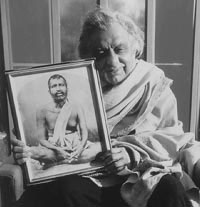 Swami Aseshananda, direct disciple of Sri Sarada Devi, was the head of the Portland Vedanta Society in Oregon from 1955 until his passing at the age of 97 in 1996. A dynamo of spiritual energy who profoundly affected the lives of countless beings through constant worship, personal instruction, public outreach, and untiring attention to other facets of spiritual life, Swami exemplified the best of Sanatana Dharma teachings.
Swami Aseshananda, direct disciple of Sri Sarada Devi, was the head of the Portland Vedanta Society in Oregon from 1955 until his passing at the age of 97 in 1996. A dynamo of spiritual energy who profoundly affected the lives of countless beings through constant worship, personal instruction, public outreach, and untiring attention to other facets of spiritual life, Swami exemplified the best of Sanatana Dharma teachings.
Lecturing several times each week on the Message of Vedanta, his topics were varied yet he never failed to include the crucial teaching regarding the need of a guru. He often emphasized the four qualifications of a true teacher according to Shankaracharya:
• To impart the teachings with no ulterior motive• To live a pure and stainless life
• To know the essence of the scriptures
• To be a knower of Brahman
It was Sri Ramakrishna and Sri Sarada Devi that he pointed to as the epitome of such a teacher. To him They were the highest ideal; he lived in Them and They lived in him.
Swami Aseshananda was born July 10, 1899, in Faridpur, India. In his adolescence he studied philosophy at St. Paul's Cathedral Mission College in Calcutta. He was blessed with initiation by Holy Mother in 1917 and subsequently joined the Ramakrishna Order in 1921, receiving initiation into Brahmacharya from Swami Brahmananda in 1922 and his final vows of Sannyasa from Swami Saradananda in 1923. Thus, many of the God-realized direct disciples of Sri Ramakrishna were his teachers. He served as private secretary to Swami Saradananda, the General Secretary of the Order, from 1921 to 1927. Later, he worked at the Varanasi Advaita Ashrama and the Madras Students' Home in India.
In 1947, the Swami was sent to the United States to serve as the Assistant Minister to Swami Nikhilananda at the Ramakrishna-Vivekananda Center of New York (1947-49). Serving briefly at the Vedanta Society of Boston, he then was sent to the Vedanta Society of Southern California in Hollywood for the next 5-6 years where he served as Assistant Minister to Swami Prabhavananda, especially at the monastery at Trabuco. He came to Portland on February 5, 1955, as Minister-in-charge and served in that capacity until he passed on. It is significant to note that unlike any other swami sent to the U.S., Swami Aseshananda never once returned to his homeland. He was once heard to say that Holy Mother had sent him to the West, and thus he would stay.
"Western science has split the atom, releasing a great power for potential destruction, but
Sri Ramakrishna, [by the power of his intense sadhana] has split the curtain of Maya,
releasing a great power for realization." "Power and Peace do not go together: If you seek power you get Rolls Royces; if you seek Peace you get God." "Renunciation is not condemnation, but deification." — Swami Aseshananda
Babaji Bob Kindler, spiritual director of the independent SRV associations, met Swami Aseshananda in Portland when the Swami was in his 80's. Reflecting upon his experiences as his disciple, Babaji wrote the following passages after Swami's passing:
"The expression, 'passed on,' is an inappropriate term in his [Swami's] case, for the Atman, That which the Swami fully identified with, which is the eternal Soul of every living being, has nowhere to go, being all-pervasive and ever-permanent. Therefore, like other devotees of Holy Mother, this great Swami, who gave his entire life in Her service and in the service of Sri Ramakrishna Paramahamsa, is now all about us and within us, permeating us as our very consciousness.
He was fully committed to the Order that bore his master's name, but one always got the feeling that his true allegiance was to the Master and Holy Mother themselves rather than to an organization. He never returned to India after leaving it for service in the West, and this demonstrates the width and breadth of his realization, for time, place, circumstance and personal considerations were all sacrificed or overlooked in lieu of the essentials of spiritual life. To him, the Atman was all, was everywhere, existing both throughout and beyond everything. In all respects, his mind was undivided and he fully epitomized the high ideal of absolute Unity which others only talk about.
Once, I heard that some Catholic nuns had come to him, attracted by the life of Sri Ramakrishna. Though they wanted to embrace that ideal, he sent them back to their church. Later I learned that he had initiated them. This I cannot substantiate, but it would not surprise me in the least. He was so apparently orthodox in certain ways, but absolutely unorthodox in others. For instance, several times a day, month after month, for years and decades, without fail and until he could no longer bend his knees due to old age, he worshipped the Universal Mother in the Vedanta Society shrine room. This formal worship occurred side by side and in perfect harmony along with his adherence to non-dual philosophy. This impressed me the most and taught me that there is no contradiction between external worship and non-dual realization, that, in fact, the two must go hand in hand to complete the picture. He was not a mere jnani or an ordinary bhakta, but was instead a Brahmajnani and a devotee of the Divine Mother who blended life-long service with uncompromising faith in the ideal.
I cherish greatly the many teachings that he transmitted directly into my heart and mind. Meditating with him transformed me, though I suffered on some occasions and enjoyed spiritual bliss at others. He answered my questions as they came into my mind before I could voice them, and many teachings pertinent to my spiritual growth were spontaneously emphasized during his many lectures. Most wonderfully, Holy Mother was there within him. So many of us had the great boon and blessing of having her darshan through his clear and pure presence.
In truth, we have felt his presence strongly over these past years as we attempt to mold the Sarada/Ramakrishna/Vivekananda Association (SRV) into a strong organization for service and Self-realization. I see the Holy Mother's hand in this, for Swami Aseshananda was the first to give his verbal support of this venture when Lex Hixon and I approached him for his perspective in 1985. 'Yes,' he said, 'gather together in a spirit of reverence and offer it all to Holy Mother and Sri Ramakrishna.' After a meaningful pause he added, 'Have everyone read from It (the Gospel of Sri Ramakrishna) every day too.'
About most other teachers I have met, I can say little. About Swami Aseshananda, I can say that I met and took refuge with a Jivanmukta, a fully liberated being. Portland, due to his presence, has become a place of pilgrimage — one of the very few existing in the United States.
Salutations to my guru, forever!"
Suggested Reading:
- Walking the Wisdom Path: Lectures in the Jnana Marga, excerpts from Nectar of Nondual Truth
- Glimpses of a Great Soul, A Portrait of Swami Saradananda, by Swami Aseshananda
(December 25, 1941 - November 1, 1995)
Lex Hixon on Himself
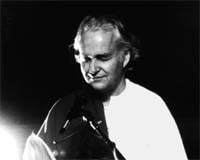 "I grew up in the cultural openness and wild sacred energy of Southern California. I was not raised conventionally or religiously. Freedom was the keynote of my parent's philosophy. At thirteen I went to a conservative Boy's Academy in Connecticut. These were four years of blessed discipline. The effect of this almost monastic atmosphere was a great intensification of my awareness. Here, under the guidance of wonderful minds and spirits, I became a practicing poet, philosopher, musician, and spiritual seeker. These four strands have interwoven in my life ever since then.
"I grew up in the cultural openness and wild sacred energy of Southern California. I was not raised conventionally or religiously. Freedom was the keynote of my parent's philosophy. At thirteen I went to a conservative Boy's Academy in Connecticut. These were four years of blessed discipline. The effect of this almost monastic atmosphere was a great intensification of my awareness. Here, under the guidance of wonderful minds and spirits, I became a practicing poet, philosopher, musician, and spiritual seeker. These four strands have interwoven in my life ever since then.
"Rather than returning to the cultural comforts of California, I remained in the more challenging context of the east coast, attending Yale University for four years, then moving to New York City. I graduated in Philosophy, with an honors paper on Soren Kierkegaard, my first formal spiritual guide. Kierkegaard opened wide for me the dimension of the spiritual, which he clearly demonstrated to lie beyond what he called the aesthetic and the ethical or logical.
"At age 19, I became consciously Christian, under the guidance of the father of a college roommate, Vine Deloria Senior, a Lakota Sioux Episcopal priest. The rich, non-European Christianity of Father Deloria, subtly based in his Native American heritage of vision-quest, blended into the intense, existential Christianity of Kierkegaard, with its sharp critique of Hegelian rationalism, the tendency of European expansionist thinking. Thus, my spiritual life began as a confluence of European and non-European currents. "During college, I encountered traditional Zen through Alan Watts as well as the non-tradition of Krishnamurti. I also discovered The Gospel of Ramakrishna, which I began reading after graduation in 1963. I met the author of this extraordinary book, Swami Nikhilananda, by visiting the address of the publisher, printed on the back cover. My wife Sheila and I studied, traveled and meditated with the Swami for the last seven years of his life. He became the God-father of our four children. Following his guidance, I began studies for the Ph.D. at Columbia University, finally completing my dissertation on the Gaudapadakarika in 1976. My gratitude to him knows no bounds.
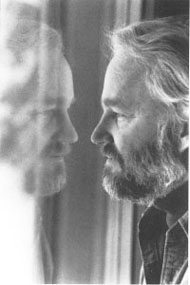 "During my ten years as a graduate student, I became a radio journalist, broadcasting a weekly, two hour interview show called "In the Spirit," over New York radio (WBAI), from 1971 to 1984. This endeavor involved a tremendous amount of fieldwork in newly emerging American spiritual consciousness, as well as an opportunity to meet the finest representatives of world-traditions who visited New York City. I met literally hundreds of teachers and students - both unknown and well-known, both authentic and not-so-authentic-observing the interesting dynamics of cultural interaction and spiritual growth. At this time I also began to study classical Indian music under the master sarodist, Vasant Rai.
"During my ten years as a graduate student, I became a radio journalist, broadcasting a weekly, two hour interview show called "In the Spirit," over New York radio (WBAI), from 1971 to 1984. This endeavor involved a tremendous amount of fieldwork in newly emerging American spiritual consciousness, as well as an opportunity to meet the finest representatives of world-traditions who visited New York City. I met literally hundreds of teachers and students - both unknown and well-known, both authentic and not-so-authentic-observing the interesting dynamics of cultural interaction and spiritual growth. At this time I also began to study classical Indian music under the master sarodist, Vasant Rai.
"In 1975 I offered a course at the new School for Social Research. These well- attended spring term lectures were recorded, transcribed, and painstakingly edited. They became Coming Home: The Experience of Enlightenment in Sacred Traditions, published by Doubleday in 1978. Some twenty thousand copies were sold before the book went out of print. In 1988, Jeremy Tarcher reprinted Coming Home, and it has become a classic in its field.
"In 1980, I accepted the formal responsibility as a spiritual guide, or Sheikh, in the seven hundred year old Khalwati-Jerrahi Order from Egypt and Istanbul. My duty included care and guidance for four communities of Sufis. I was privileged to make the traditional Hajj, or pilgrimage to Mecca and Medina, with my Sheikh in 1980, at the pivotal age of forty. Three books emerged from this Islamic experience: Heart of the Koran published in 1988, Recollecion de la Miel (Gathering Honey) published in 1989, and Atom from the Sun of Knowledge. These books are well regarded by Muslims and non-Muslims alike and they represent a kind of informal peace initiative.
"Beginning with Zen, under the Japanese master Eido Roshi during the late sixties, and moving into Tibetan Tantric Buddhism in the mid seventies, my study and practice of Buddhist meditation has been ongoing. A book, Mother of the Buddhas, has emerged from this experience as well. My wife and I were privileged to make the pilgrimage to Bodhgaya and Sarnath in India with our Lama, Tomo Geshe Rinpoche, in 1981. In 1983, Sheila and I entered a formal, three year study of the mystical theology of the Eastern Church at Saint Vladamir's Seminary. We sacramentally joined the Orthodox Church, attending for a period of several years, and we still attend the chapel there as parishioners. None of these spiritual studies and practices have become outmoded in my life, and I try to remain current in four sacred traditions - Ramakrishna Vedanta, Vajrayana Buddhism, the Jerrahi Dervish Order, and Eastern Orthodox Christianity.
"In 1992, came the publication of Great Swan: Meetings With Ramakrishna. This book holds the key to unlock all my life experiences. It provides a bridge between East and West, a bridge which I have crossed in both directions and which many people will be able to cross comfortably, maintaining their intellectual, cultural and spiritual integrity. Essential secrets for the unfolding of cultural interaction and spiritual growth in the 21st century are encoded in this vibrant portrait. With Ramakrishna as our inspiration, our subtle task is to create a global society based on the intuitive sense of the Sacred, a society with rich diversity yet without boundaries."
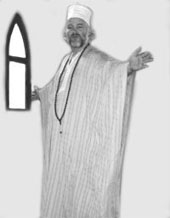 Lex "entered" final liberation on November 1st, 1995, which was also, fittingly enough, both All-Saints Day and Jagaddhatri Puja, the holy day dedicated to Sri Sarada Devi's chosen ideal. He remained conscious and light-hearted right up to the moment of leaving the body, despite dealing with cancer. Lex Hixon "passed away" as he had lived, consciously, happily, and spiritually. His final book entitled "Living Buddha Zen" was released just prior to his passing.
Lex "entered" final liberation on November 1st, 1995, which was also, fittingly enough, both All-Saints Day and Jagaddhatri Puja, the holy day dedicated to Sri Sarada Devi's chosen ideal. He remained conscious and light-hearted right up to the moment of leaving the body, despite dealing with cancer. Lex Hixon "passed away" as he had lived, consciously, happily, and spiritually. His final book entitled "Living Buddha Zen" was released just prior to his passing.
In the Spirit Radio on WBAI New York City
From the early 1970's through the late 1980's, Lex Hixon hosted a radio program at WBAI in New York City that was unprecedented in its depth, scope, insight and creativity. Entitled "In The Spirit," it appeared as both "Body/Mind/Spirit" for a time and "Spirit/Mind/Body" as well. On this long running inspirational program that spanned two decades and which was sponsored in listener supported fashion on WBAI Radio, Lex interviewed educators, healers, clergy, authors, artists, psychics, spiritual leaders, teachers and a host of others.
As a list, the fruit of this selfless work reads like a comprehensive Who's Who of the spiritual, artistic and intellectual heart and mind of both eastern and western cultures. With subtle tenderness and insight, though never lacking the penetrating edge which makes for excellent broadcasting, Lex welcomed the orthodox and the unorthodox, the conservative and the radical, the famous and the obscure, the popular and the controversial, the powerful and the humble, the aggressive and the retiring. He interviewed swamis, priests, rabbis, roshis, sheikhs, rinpoches, yogis, gurus, poets, musicians, psychics, occultists, authors, writers, teachers, politicians, businessmen and more-a collection which also includes such guests as the Dalai Lama and Mother Teresa, to name a few.
This set of programs, which numbers over 300 titles, is now offered on CD in individual recordings ranging from the half-hour interview to the ninety-minute program. Special rates are available for those who are interested in the entire set of 331 programs or for orders exceeding 10 programs.
The Books of Lex Hixon
Lex Hixon's literary works came about from direct experience in the field of spirituality combined with intellectual refinement and human sensitivity. Being intensely involved in both the cultures and religions of the world, his was a view of universal acceptance honed by discrimination and dedicated to harmony based on unity.
These living books are for all who take their spiritual path seriously as also for those who desire to intensify their commitment to and expand their understanding of religion, philosophy and spiritual life. Additionally, novices and newcomers to the path will find in these works a timeless message of hope and inspiration which will facilitate a transformation of the human mind and a spiritualization of everyday life.
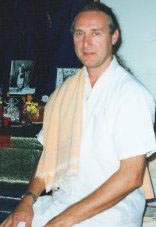 Babaji Bob Kindler began his formal spiritual training in Yoga and Vedanta in 1970 at the age of twenty. After more than a decade of spiritual austerities and extensive study of the scriptures in Eastern Traditions, he received initiation into the Ramakrishna lineage by Swami Aseshananda, a direct disciple of Sri Sarada Devi, wife and spiritual consort of Sri Ramakrishna Paramahamsa. He also received guidance and instruction from Swami Nityasvarupananda, another direct disciple of Holy Mother, and training in ritualistic worship from Swami Damodarananda, both of the Ramakrishna Order as well.
Babaji Bob Kindler began his formal spiritual training in Yoga and Vedanta in 1970 at the age of twenty. After more than a decade of spiritual austerities and extensive study of the scriptures in Eastern Traditions, he received initiation into the Ramakrishna lineage by Swami Aseshananda, a direct disciple of Sri Sarada Devi, wife and spiritual consort of Sri Ramakrishna Paramahamsa. He also received guidance and instruction from Swami Nityasvarupananda, another direct disciple of Holy Mother, and training in ritualistic worship from Swami Damodarananda, both of the Ramakrishna Order as well.
Babaji's emergence as a teacher of Sanatana Dharma occurred naturally with the creation of Jai Ma Music, an acclaimed sacred arts ensemble which he founded in 1980 as a vehicle for the exalted teachings of India through wisdom-oriented devotional music. He also received encouragement from his friend, Lex Hixon, the instigating force and co-founder of the national SRV Association of the West, based in New York state.
Throughout the 80's and 90's, Babaji and Jai Ma Music toured the United States offering concerts of bhajans and chanting, lectures, classes, workshops and seminars on the various aspects of Vedic Wisdom at temples, churches, schools and spiritual centers. Trained as a classical musician from the age of eleven, he also fulfilled a career as an instrumentalist, appearing as a professional soloist, accomplished chamber player, and orchestral cellist for 30 years. His classical training in Yoga, Vedanta, and the Fine Arts is reflected in his style of teaching at the SRV ashramas, where the profound Wisdom of India's perennial philosophies are effectively integrated with devotional and instrumental music from both East and West.
Babaji's approach as a spiritual teacher blends a traditional, non-compromising foundation with personal realization, devotion to Guru and scripture, a deep reverence and concern for aspiring beings, and a special ability to access and transmit a variety of spiritual teachings, matching them to the needs of individual students. He teaches Vedanta, the Four Yogas, Tantra, Meditation, Buddhism and other systems of philosophy and religion emphasizing the Advaitic or non-dual standpoint.
As Spiritual Director of the independent SRV associations, formed in 1993, Babaji visits the centers approximately three times a year. He leads up to four retreats throughout the year at various locations and offers group pilgrimage to India every two or three years. These occasions give participants the opportunity to experience in greater depth the transformative and transcendent quality of non-dual Truth. The retreats integrate knowledge, devotion, meditation and selfless service through study of scripture, chanting, introspection, worship, and holy company. These spiritual disciplines, engaged in within the proximity of guru and sangha, bring purity of heart and clarity of mind. This allows aspiring beings who are living in the world to withdraw into solitude, experience sacred communion with their inner Self, and focus on Divine Reality. An accessible teacher, students and friends can easily maintain personal contact with Babaji through email, letters, phone calls, private meetings, satsangs (meetings with sangha and guru for informal spiritual discourse), classes, retreats and group excursions. He welcomes novices, members of other religious paths, and all sincere seekers at the SRV centers. Personal initiation into the SRV Association and individual guidance in spiritual life is offered to those who accept the universal teachings in accordance with Vedanta ideals represented by Sri Ramakrishna, Sri Sarada Devi and Swami Vivekananda.
In addition to composing over 25 albums of devotional and instrumental music, Babaji is an author of many spiritual books. His published titles are:
- Footfalls of the Indian Rishis
- Cosmic Quintuplications: The Secret of Panchakarana
- Jnana Matra: The Wisdom Particle
- Manasana: The Superlative Art of Mental Posture
- Dissolving the Mindstream: Withdrawing Name & Form in Meditation
- Reclaiming Kundalini Yoga
- A Quintessential Yoga Vasishtha
- Swami Vivekananda Vijnanagita
- An Extensive Anthology of Sri Ramakrishna's Stories
- Sri Sarada Vijnanagita
- The Avadhut and His Twenty-Four Teachers in Nature
- Twenty-Four Aspects of Mother Kali
- The Ten Divine Articles of Sri Durga: Insights and Meditations
- We Are Atman All-Abiding: 108 Verses on the Atman
- Strike Off They Fetters!
- Commentary on the Song of the Sannyasin, Swami Vivekananda's Classic Poem of Truth, Unity, and Freedom
- Hasta-Amalaka Stotram: A Hymn of Eternal Enlightenment
All of Babaji's books as well as his music are available through our Online Store or please visit any of our SRV Centers.
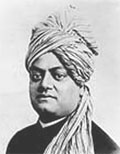 Acknowledged as the foremost of Sri Ramakrishna's many notable disciples, both lay and monastic, Swami Vivekananda was an illumined being of the highest order. As the forerunner who brought the spiritual teachings of India to the West in 1893 at the convening of the Parliament of Religions in Chicago, he has greatly influenced the last hundred years of spiritual growth in Europe and America.
Acknowledged as the foremost of Sri Ramakrishna's many notable disciples, both lay and monastic, Swami Vivekananda was an illumined being of the highest order. As the forerunner who brought the spiritual teachings of India to the West in 1893 at the convening of the Parliament of Religions in Chicago, he has greatly influenced the last hundred years of spiritual growth in Europe and America.
The regeneration of India that is taking place at present, as well as the new respect and reverence for its ancient culture and spiritual treasures the world over, is also greatly due to His untiring efforts. Like his Master, Sri Ramakrishna, and his feminine inspiration, SrI Sarada Devi, a wealth of praise in the form of songs, hymns and writings have been written by his many admirers, both eastern and western. Many of these acknowledge him as a modern Buddha and an emanation of Lord Shiva:
We offer everlasting tribute to Swami Vivekananda, who is Shiva incarnate, the radiant sun of knowledge reverently adored by celestial and earthly beings. With a glance filled with compassion, He shatters the confusing morass of negativity while conferring the sought after boons of fulfillment and liberation. To Vivekananda, the Supreme Teacher, adorned with the new moon as his emblem and worshiped by all beings, to the One, we pay homage.
Born in Calcutta in 1863, he passed into mahasamadhi (final absorption into Absolute Reality) just 39 years later. Like Shankara, who lived a very short physical life but who regenerated India and added considerably to the world's spiritual wealth, Swami Vivekananda possessed an illumined intellect, a vast and retentive memory, a heart devoted to God that was full of compassion for his fellow human beings and an ever-present realization of his true nature, whether working, worshiping or meditating.
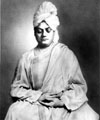 As a monk, he gave the word and the station a new meaning. Not content to retire from the world and blissfully contemplate his own inner realization, he founded a religious order based upon service to mankind without compromising the highest ideals of spiritual life. The motto he chose for the Ramakrishna Order "atmano mokshartha jagad dhitaya cha" states this well: "For the realization of the Self and the benefit of the world."
As a monk, he gave the word and the station a new meaning. Not content to retire from the world and blissfully contemplate his own inner realization, he founded a religious order based upon service to mankind without compromising the highest ideals of spiritual life. The motto he chose for the Ramakrishna Order "atmano mokshartha jagad dhitaya cha" states this well: "For the realization of the Self and the benefit of the world."
In addition to the humanistic element in his work, the swami broke through many other types of antiquated taboos concerning outmoded traditional values. Being the first to leave India in order to teach the timeless message of Vedanta to the rest of the world, Vivekananda broke with the tradition and lost his caste as a result. Criticized for this and for teaching the Vedic wisdom to foreigners, the swami explained that the lover of God has no caste restrictions that the devotees of the Lord form their own caste. By this fearless action and in many other ways, Vivekananda destroyed old conventions and concepts, opening the way for spiritual teachers from the east to come westward.
"Shankara left this Advaita [non-dual Vedanta] philosophy in the hills and forests; while I have come to bring it out of those places and scatter it broadcast before the work-a-day world and society. The lion-roar of Advaita must resound in every hearth and home, in meadows and groves, over hills and plains. Come all of you to my assistance, and set yourselves to work...
"...granted that you attain personal liberation by means of the realization of the Advaita, but what matters it to the world? You must liberate the whole universe before you leave this body. Then only you will be established in the eternal Truth. Has that bliss any match...?
"You will be established in the bliss of the Infinite, which is limitless like the skies. You will be struck dumb to find your presence everywhere in the world of soul and matter! You will feel the whole sentient and insentient world as your own self. Then you cannot help treating all with the same kindness as you show towards yourself. This is indeed practical Vedanta."
— Talks with Swami Vivekananda, pp. 203-204.
Swami Vivekananda was not a retiring or reticent figure. Neither was he an austere or aloof monk with a superior attitude or a spiritual ego. His down-to-earth policies of beneficial action coupled with an unsurpassed knowledge of the scriptures place him in a league all his own. Yet, he was not content to work slavishly in an imperfect world, only to advocate profound philosophy to secular and materialistic societies. His was a plan that incorporated selfless service to suffering millions with the living realization of God both within the world and beyond it as well. The eternal religious principles he espoused were, to him, directly realizable in everyday life, and not content to merely point them out, he fashioned new and refreshing avenues of spiritual expression for them.
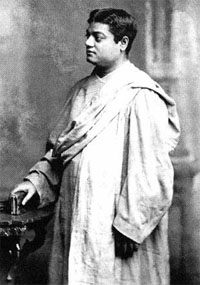 This resurrection of the timeless truths of Vedanta, spoken of now as neo-Vedanta by his friends and disciples, was given by Swami Vivekananda from the non-dual standpoint. The Advaitic aspect of Vedanta was very dear to him and he saw in it the solution for all the problems of relative existence. This did not diminish his love for and his devotion to the Divine Mother Reality that was essential to Sri Ramakrishna's new dispensation. About Mother Kali, Sri Ramakrishna's Chosen Deity, Swami Vivekananda said, "You do not understand, She is my especial Ideal."
This resurrection of the timeless truths of Vedanta, spoken of now as neo-Vedanta by his friends and disciples, was given by Swami Vivekananda from the non-dual standpoint. The Advaitic aspect of Vedanta was very dear to him and he saw in it the solution for all the problems of relative existence. This did not diminish his love for and his devotion to the Divine Mother Reality that was essential to Sri Ramakrishna's new dispensation. About Mother Kali, Sri Ramakrishna's Chosen Deity, Swami Vivekananda said, "You do not understand, She is my especial Ideal."
In Swami Vivekananda, then, are seen elements of non-dual realization harmonized perfectly with the diverse modes and expressions of spiritual life and lore in the world. Vedantic Truth, Tantric practice and Yogic realization were all fused perfectly in him. His ability to reveal the Truth, implement the practice and lead the way unto realization was a special quality he possessed and he thereby caused and convinced countless beings, wealthy kings, wise scholars, middle-class workers, and even poor and impoverished beings to enter into spiritual life. Advising adamant faith in God rather than adherence to institutionalized religion, and reliance upon the Self within rather than dependence on antiquated religious texts and worldly-minded clergy, he encouraged all to seek the unalloyed bliss of freedom and the profound peace of inner realization. Examples of this are found in his exquisite poems:
Where seekest thou? That freedom, friend, this world nor that can give.
In books and temples vain thy search.
Thine only is the hand that holds the rope that drags thee on.
Then cease lament, let go thy hold, Sannyasin bold!
Say — "Om, Tat Sat, Om!"
— verse from the Song of the Sannyasin
The Swami's mission in the West is well-documented. Making contact with thousands of people via lectures, discourses, classes on Yoga and philosophy, informal meetings and personal interviews, he was a man that combined the fine art of mature detachment with a refined appreciation for the divinity present in human beings and in all things. Like his poems, the books that were published in his name are exceptional, for he seldom wrote, preferring to transmit his message in person. Adept stenographers, however, always seemed to be present and they took down his words verbatim, leaving the world a wonderful treasury of "living books" which come straight from the source.
Appreciated as both a spiritual luminary of the highest order and a patriot acting for the well-being of his country, Swami Vivekananda stands out as a leader of souls. His illumined mind, tender heart, impeccable character and far-seeing vision will always guide and inspire those who take refuge in him. As he himself declared:
"I will be born a thousand times and bear a thousand miseries if I can but help one suffering being to gain liberation."
And again,
"I will come back again and again until all the beings of the world know that they are one with Brahman."
Suggested Reading:
-
Strike Off Thy Fetters, Commentary on Swami Vivekananda's Song of the Sannyasin, by Babaji Bob Kindler
-
Vivekananda Vijnanagita, The Wisdom Song of Vivekananda, edited and arranged in verse form by Babaji Bob Kindler
-
Vivekananda: A Biography, by Swami Nikhilananda, Advaita Ashrama
-
Talks with Swami Vivekananda, by Advaita Ashrama
-
Inspired Talks, Swami Vivekananda, by Advaita Ashrama
-
In Search of God and Other Poems, Swami Vivekananda, by Advaita Ashrama
-
The Complete Works of Swami Vivekananda, by Advaita Ashrama
(This 9 volume set includes every known book, lecture, poem and letter produced by Swami.)
SRV EMAIL LIST
Receive news about SRV
Classes, Retreats, New Publications,
Nectar Magazine, and more.







